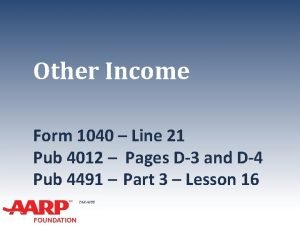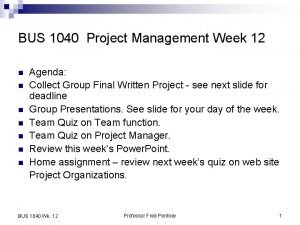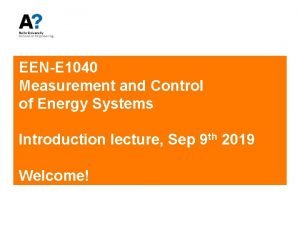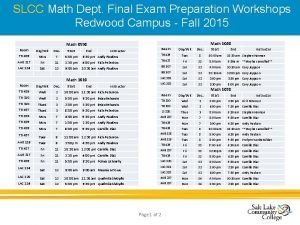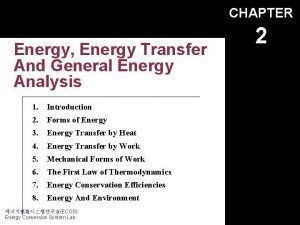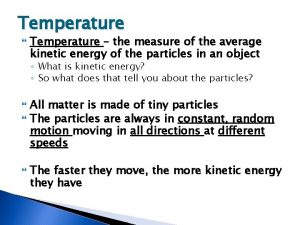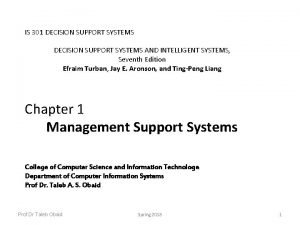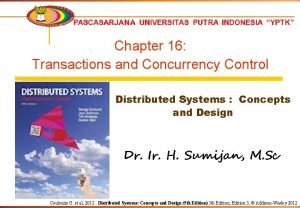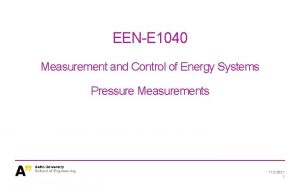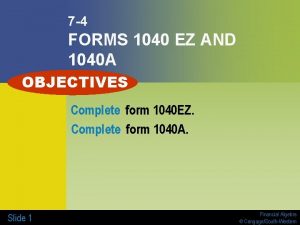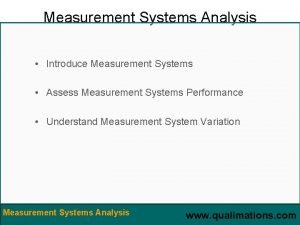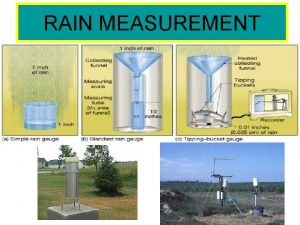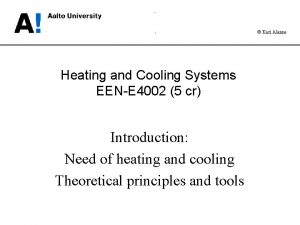EENE 1040 Measurement and Control of Energy Systems














- Slides: 14

EEN-E 1040 Measurement and Control of Energy Systems Introduction lecture, Sep 9 th 2019 Welcome!

Teaching staff Responsible teacher Laboratory manager Simo Kilpeläinen (Control demonstration) Other teachers Laboratory manager Otto Blomstedt (Combustion engine) Laboratory manager Kari Saari (Temperature measurement) Senior University Lecturer Tuomas Paloposki (Flow measurement)

Goals After passing the course, the student • knows the measurement principles of temperature, humidity, flow and other relevant quantities in energy technology • • is able to use regular measuring and data acquisition equipment • • is able to estimate measurement uncertainty in a quantitative manner is able to identify most important factors influencing the measurement result and measurement uncertainty knows which factors influence the gain and dynamics of a process and is able to tune a PID-controller

Lectures Period 1: • Intro (this lecture) • Flow measurement • Temperature measurement Sep 16 th • Pressure measurement • Measurement uncertainty Mon Sep 9 th Thu Sep 12 th Mon Thu Sep 19 th Mon Sep 23 rd Period 2: • Control II • Data Acquisition Mon Oct 28 th Thu Oct 31 st Mon Nov 4 th

Laboratory measurements On Fridays in both fall periods Done in groups of ~4 people • Measurement + written report • Groups made later today Period 1 (weeks 38 -42): • Temperature measurement • Flow measurement Period 2 (weeks 44 -48): • Control demonstration • Device measurement (combustion engine)

Passing the course In order to pass the course, the student needs to: • participate in each of the four laboratory measurements • write a scientific report from each measurement with his/her group and have the reports pass the grading

Absences If you can’t make it to your own group’s measurement session: • Inform the teacher responsible for said measurement • Inform the rest of your group • Discuss with the teacher whether you can join another group as a guest at a later (or earlier) time • Write the report with your own group as if you had done the measurements with them

Grading • Each report is graded on a scale from 0 to 5 • Course grade = Average of four report grades + individual factor • Individual participation is evaluated via peer-review within the group – Done after all four reports have been handed in – Individual grade adjustment can be +/- 1 or 0

Communication • Course communication will mainly be done via My. Courses – Places and times to meet at before each measurement – Possible scheduling changes – Addendum to any course materials • Some more individual topics (report feedback etc. ) will be discussed over email, or in person if requested

Teamwork Typical characteristics of teamwork: • People working together towards a common goal • Typical superior-subordinate hierarchy often absent Try to get along with others in your group! • Teams usually temporary, assembled for e. g. a project Take advantage of the situation, get acquainted with others in your team!

Assembling a team Skills & Background • Versatility all grounds covered, individual expertise in various areas adds up and makes the team stronger Participation possibilities • Scheduling, other limitations Team chemistry, working manners

How to work as a member of a team Trust: Keep your promises! Reciprocity: Do what others expect you to do, don’t be a freeloader! Equality: Each member of the team is equally important and works towards a common goal. Communication: Make sure to relay important information immediately whether the news is good or bad!

Managing schedule and workload Workload Deadline Time Deadline Workload Midterm goals Time

Instructions for making groups • 6 -8 groups in total: one sheet of paper = one group • 5 lines on each sheet of paper -> 4 -5 students in each group • Write down your name, student number and possible dates/times not suitable for you • Students not present today will get assigned to unfilled/new groups at the discretion of the teachers • Measurement times will be assigned so that as many students as possible can attend their own group’s sessions
 Pub 4012
Pub 4012 Chemsheets calorimetry 2
Chemsheets calorimetry 2 Bus 1040
Bus 1040 Rue belliard 4-6
Rue belliard 4-6 10.10.1040
10.10.1040 Math 1040 slcc
Math 1040 slcc Energy energy transfer and general energy analysis
Energy energy transfer and general energy analysis Energy energy transfer and general energy analysis
Energy energy transfer and general energy analysis Measurement and control of fermentation parameters ppt
Measurement and control of fermentation parameters ppt Hydraulic structures ppt
Hydraulic structures ppt Matter energy and measurement
Matter energy and measurement The measure of average kinetic energy
The measure of average kinetic energy Decision support systems and intelligent systems
Decision support systems and intelligent systems Transactions and concurrency control in distributed systems
Transactions and concurrency control in distributed systems Advantage of stepper motor
Advantage of stepper motor
